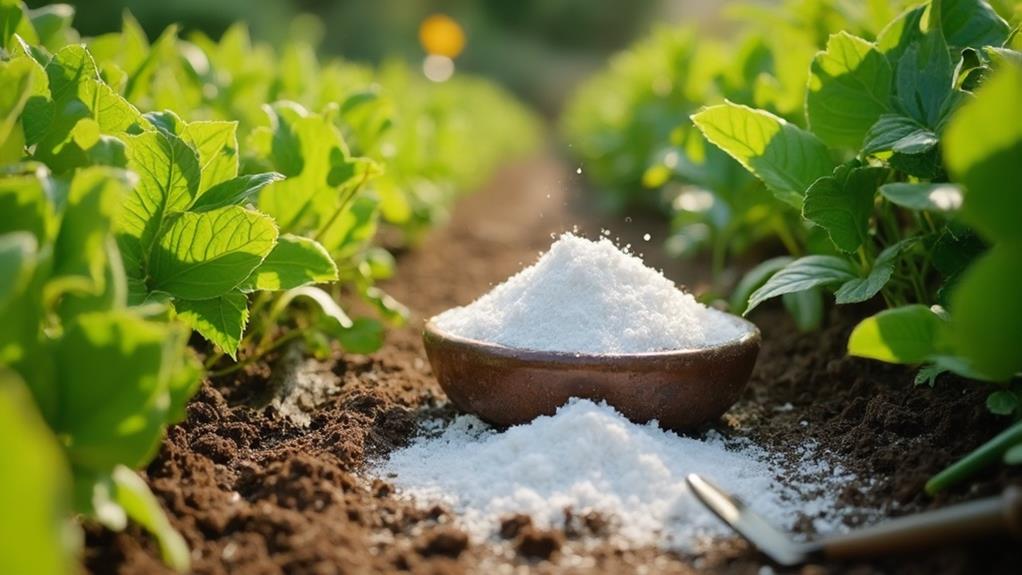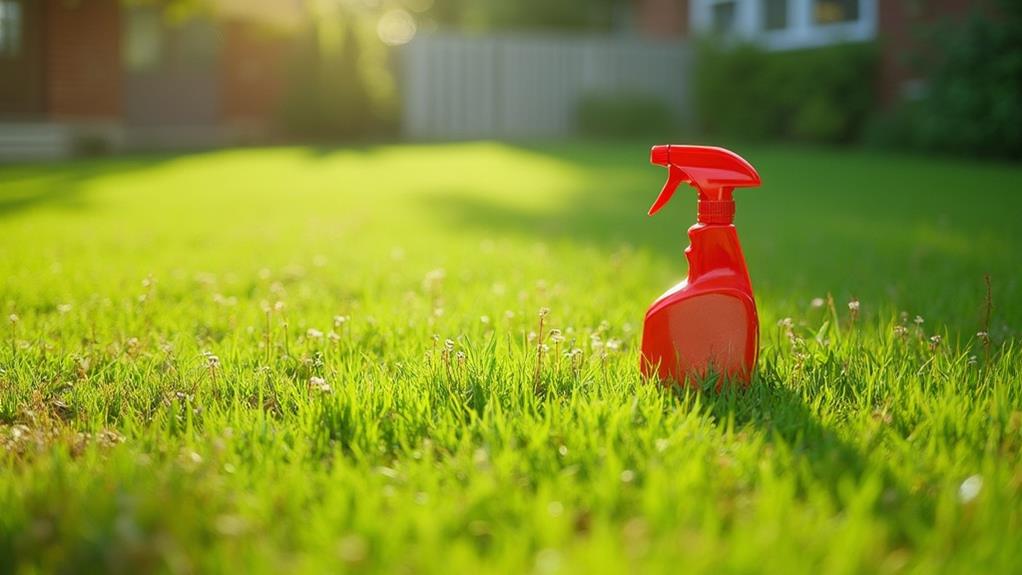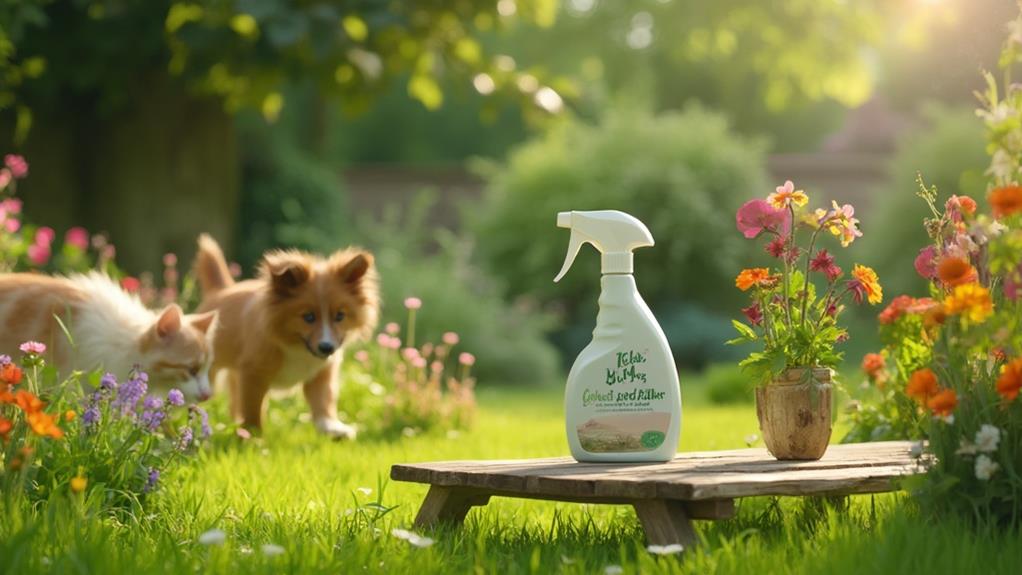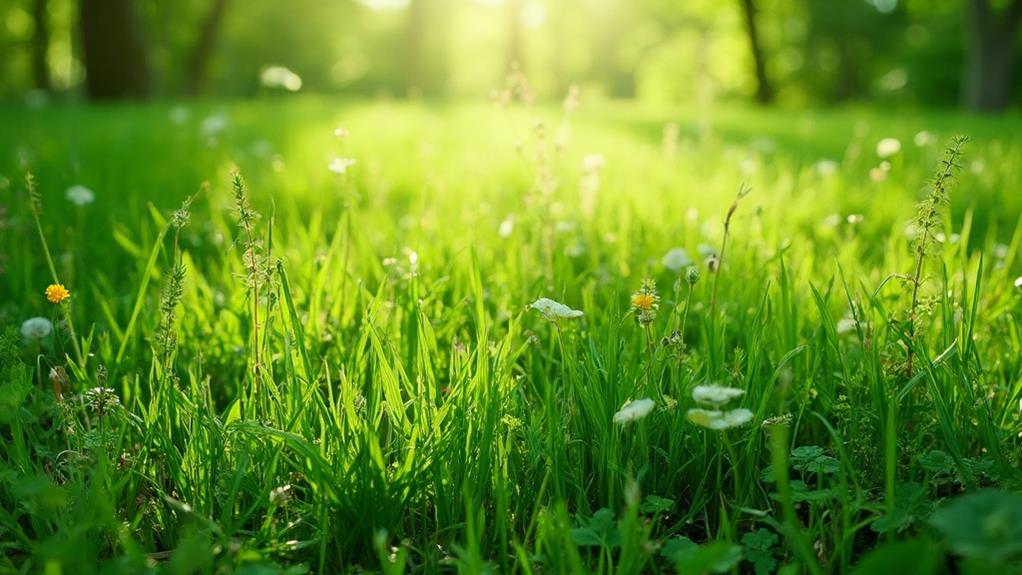Isn't it intriguing how something as simple as baking soda can transform your gardening routine? You might be surprised to learn that this common household item can effectively tackle persistent weeds without harming beneficial plants or insects. By disrupting the natural processes of unwanted vegetation, baking soda not only offers a cost-effective solution but also aligns with eco-friendly gardening practices. What's even more fascinating are the various application methods that can enhance its effectiveness, leaving you to wonder just how it all works and what results you might achieve.
Key insights
- Baking soda kills weeds by disrupting their natural processes, leading to dehydration and preventing moisture absorption.
- It's an environmentally friendly and cost-effective alternative to chemical herbicides, breaking down naturally without harming beneficial insects.
- Targeted application directly onto leaves and stems is essential for effectiveness, ideally on dry days.
- Baking soda can be combined with vinegar for enhanced weed control, ensuring a stronger impact on stubborn species.
- Many gardeners report significant success, with rapid weed reduction and improved garden health after using baking soda.
Understanding Weeds and Their Impact
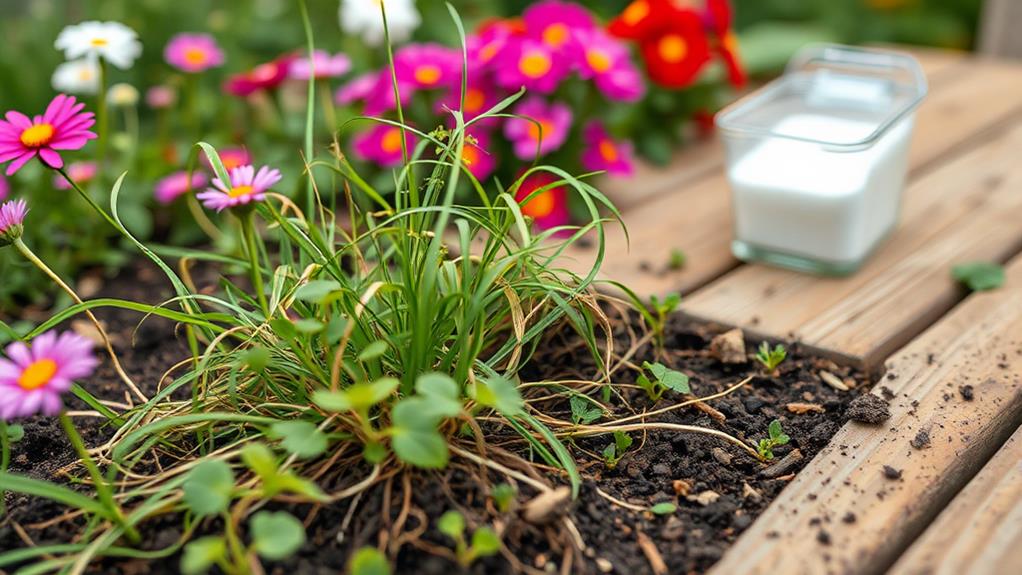
Weeds can greatly affect your garden's health and aesthetics, often competing with desirable plants for nutrients, water, and sunlight. Understanding the different weed types is vital for effective management. Some common categories include annuals, perennials, and biennials, each with distinct growth patterns and reproductive strategies.
Annual weeds, like crabgrass, germinate, grow, flower, and die within a single season, while perennials, such as dandelions, can return year after year, making them harder to eradicate.
Moreover, the environmental impact of weeds shouldn't be underestimated. They can alter soil composition, disrupt local ecosystems, and even introduce pests and diseases that harm your cultivated plants. Certain aggressive weed types may outcompete native species, leading to a decline in biodiversity.
This competition can result in a less balanced ecosystem, ultimately affecting pollinators and other beneficial organisms.
To maintain a healthy garden, it's important to identify and manage these weeds effectively. Regular monitoring, proper identification, and timely intervention can prevent weeds from becoming a more significant issue, ensuring your garden thrives while minimizing the negative environmental impacts associated with unchecked weed growth.
How Baking Soda Kills Weeds
When you're looking for an effective, natural way to combat weeds in your garden, baking soda can be a surprisingly powerful ally. Its composition primarily consists of sodium bicarbonate, which is key to its weed-killing properties.
When applied to unwanted plants, baking soda disrupts their natural processes. Weeds absorb the sodium through their leaves and roots, leading to dehydration and eventual death. This occurs because sodium interferes with the plant's ability to maintain proper moisture levels.
When you sprinkle baking soda directly on the leaves or around the base of the weed, it penetrates the plant's tissues, effectively blocking its ability to absorb water.
The high salt content in baking soda can also create an inhospitable environment for many weed species. However, be cautious when using it; while it targets weeds, it can also affect nearby desirable plants if not applied carefully.
Benefits of Using Baking Soda
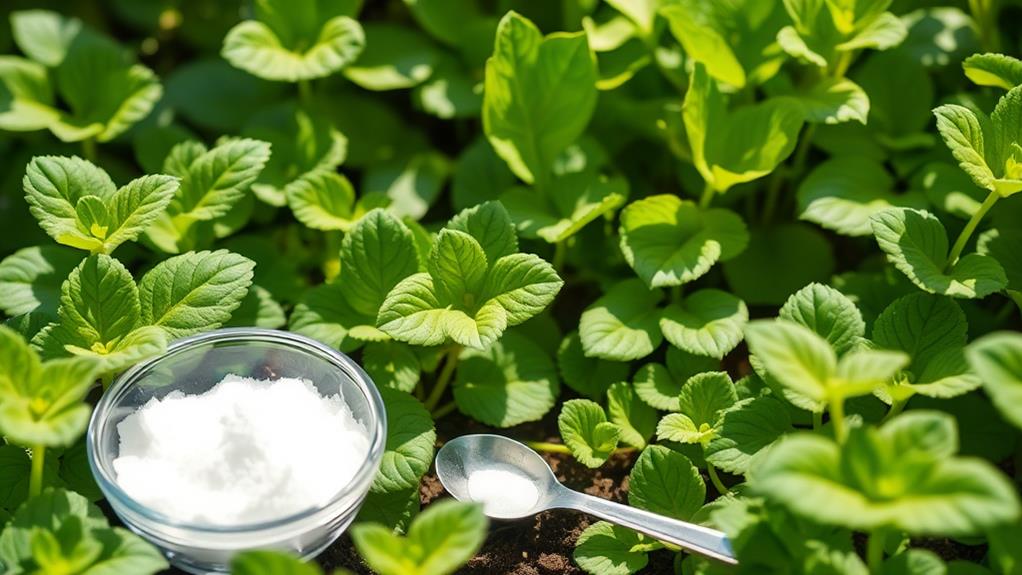
Using baking soda for weed control offers several advantages that make it an appealing choice for gardeners seeking natural solutions. One of the most significant benefits is its environmental impact. Unlike chemical herbicides, baking soda breaks down naturally, posing minimal risk to beneficial insects, soil health, and nearby plants. You can feel good knowing you're protecting the ecosystem while managing unwanted weeds.
Cost effectiveness is another strong point in favor of using baking soda. It's widely available, inexpensive, and often found in most households, making it an accessible option for anyone looking to cut down on gardening expenses. You won't need to invest in costly commercial weed killers that may contain harmful chemicals.
Additionally, using baking soda is straightforward. It requires no complicated mixing or application techniques, allowing you to tackle your weed problem quickly and efficiently. This simplicity can save you time and effort in your gardening routine.
Application Methods for Baking Soda
One effective way to apply baking soda for weed control is by creating a targeted application that directly addresses the problem areas in your garden.
Start by identifying the specific weeds you want to eliminate. Once you've pinpointed these areas, use the sprinkling technique to apply baking soda. Simply sprinkle a generous amount of baking soda directly onto the weeds, making sure to cover the leaves and stems thoroughly. This method increases the likelihood of the baking soda being absorbed and doing its job.
For a more potent solution, consider mixing the baking soda with vinegar. Create a vinegar mixture by combining equal parts vinegar and water in a spray bottle. After treating the weeds with the baking soda, spray the vinegar mixture on top. The acidity of the vinegar enhances the effectiveness of the baking soda, creating a powerful weed-killing combination.
Remember to apply these methods on a dry day, as moisture can reduce their effectiveness.
Regularly check the treated areas to monitor progress, and you can reapply as necessary until the weeds are gone. With patience and diligence, you can effectively manage unwanted plants using these simple techniques.
Safety Considerations and Precautions
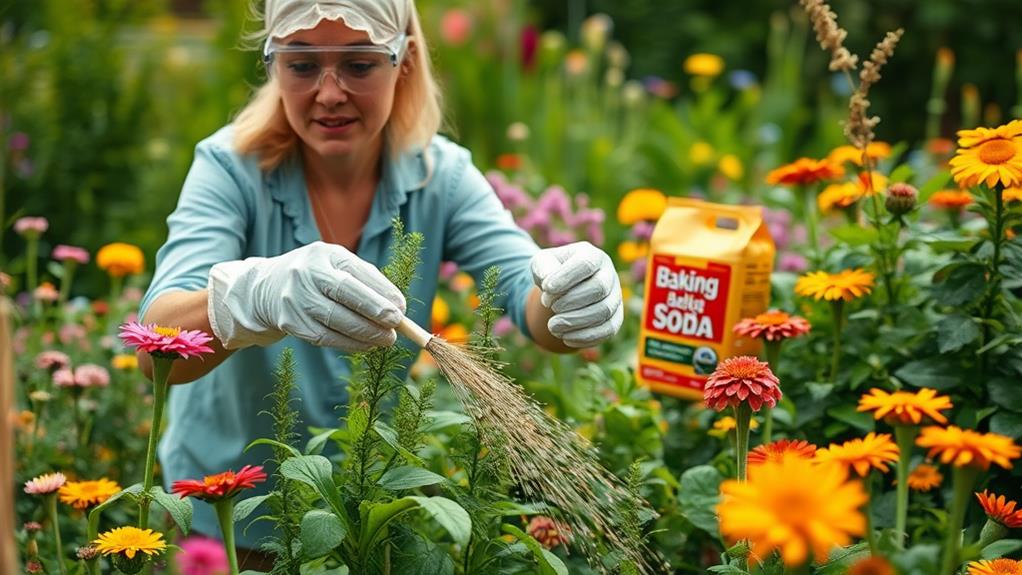
Before applying baking soda as a weed killer, it's important to understand the safety considerations and precautions involved. While baking soda is generally regarded as safe, it's vital to be aware of baking soda toxicity, particularly if you have pets or young children around.
Although the substance is non-toxic in small amounts, excessive exposure can lead to gastrointestinal issues if ingested in large quantities.
When handling baking soda, you should practice safe handling techniques. Wear gloves to prevent skin irritation and consider using a mask if you're sensitive to dust.
Make sure to work in a well-ventilated area to minimize inhalation risks. While baking soda is less harmful than many chemical herbicides, you should still avoid applying it on windy days to prevent unintended drift onto desirable plants.
Always store baking soda in a cool, dry place, out of reach of children and pets. If you're using it in your garden, apply it sparingly and monitor its effects.
Other Natural Weed Control Options
Natural weed control options offer an effective and eco-friendly alternative to chemical herbicides. By using these methods, you can manage unwanted plants without harming the environment.
Here are three practical strategies you might consider:
- Organic Herbicides: These products often contain natural ingredients like vinegar or essential oils. They can effectively target weeds while being safer for your garden and surrounding wildlife.
- Mulching Techniques: Applying a layer of organic mulch, such as wood chips or straw, can suppress weed growth by blocking sunlight. This not only prevents weeds from sprouting but also retains moisture in the soil, promoting healthy plant growth.
- Hand Weeding: Although labor-intensive, hand weeding is a precise method to remove weeds at the root. It's especially effective in small gardens or areas where you can easily access the plants.
Incorporating these natural weed control options can lead to a healthier garden ecosystem.
Success Stories and Testimonials
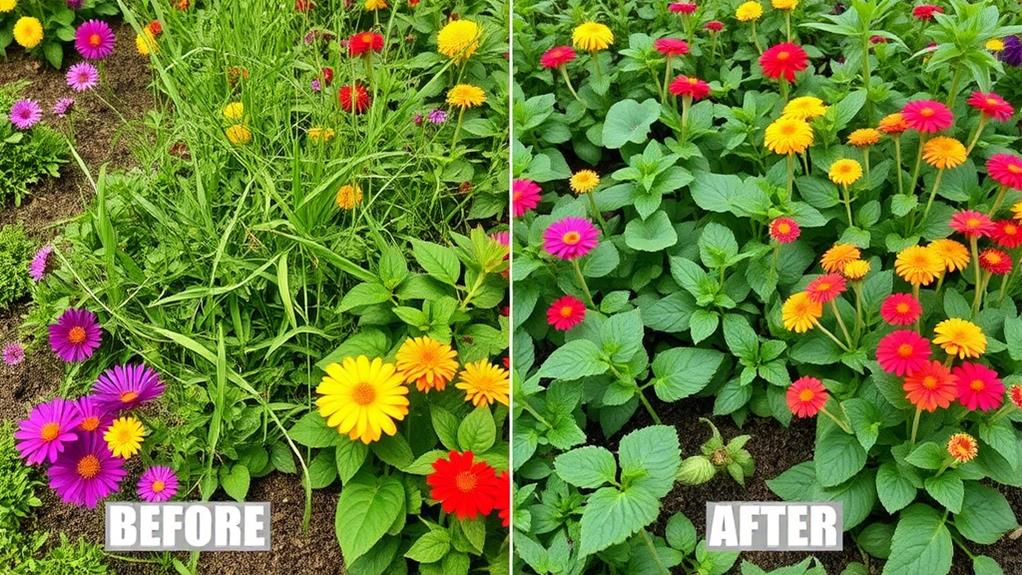
Many gardeners have found baking soda to be an effective solution for controlling stubborn weeds.
Personal experiences shared online highlight its practical application and positive results, often leading to healthier gardens.
Effective Weed Control
Baking soda has emerged as a surprisingly effective solution for those struggling with stubborn weeds. As a natural herbicide, it offers an eco-friendly alternative for organic gardening enthusiasts. You might find that using baking soda can help you maintain a weed-free garden without resorting to harsh chemicals.
Here are three key aspects to take into account when using baking soda for weed control:
- Targeted Application: Focus on applying baking soda directly to the weeds, avoiding your desired plants. This precision guarantees that you kill the weeds without harming your garden.
- Soil Health: Baking soda can alter the soil's pH, making it less hospitable for certain weed species. By understanding your soil's composition, you can optimize the effectiveness of this method.
- Cost-Effectiveness: Compared to commercial herbicides, baking soda is inexpensive and readily available. This makes it an attractive option for gardeners looking to save money while practicing sustainable gardening.
Personal Experiences Shared
From personal anecdotes shared by gardeners, it's clear that baking soda can be a game-changer in the fight against weeds. Many have experienced noteworthy reductions in weed growth, making their garden maintenance more manageable and efficient. Users have reported success in targeting specific types of weeds, often noticing results within days.
Here's a table summarizing some success stories:
| Gardener | Type of Weed | Result |
|---|---|---|
| Jane D. | Dandelions | 90% reduction in 1 week |
| Mike R. | Crabgrass | Complete eradication |
| Sarah L. | Clover | Slowed growth notably |
These testimonials highlight the practical application of baking soda in real-life gardening scenarios. It acts as a natural herbicide, effectively limiting weed growth without harming other plants. If you're looking for an eco-friendly solution to improve your garden maintenance routine, consider trying baking soda. Its simplicity and effectiveness make it an appealing option for many gardeners. By integrating this method into your weed control strategy, you may find that your gardening experience becomes much more enjoyable and less labor-intensive.
Frequently Asked Questions
Can Baking Soda Harm Beneficial Plants Nearby?
Yes, using baking soda can potentially harm beneficial plants nearby.
When you apply it, the high sodium content might alter the surrounding soil's salinity, affecting plant health.
If beneficial plants are in close proximity, they could absorb this sodium, leading to stress or even death.
It's essential to evaluate the location of your beneficial plants before using substances like baking soda, as their wellbeing can be compromised by changes in soil conditions.
How Long Does It Take for Baking Soda to Kill Weeds?
When you're using baking soda to combat weed growth, the time it takes to see results can vary.
Typically, you'll notice effects within a few days to a week, depending on the baking soda concentration you apply. Higher concentrations can accelerate the process, leading to quicker wilting of the weeds.
However, be cautious, as too much can affect nearby plants. Regular monitoring will help you determine the best approach for your garden.
Is Baking Soda Effective Against All Types of Weeds?
Isn't it ironic that something you use to freshen your fridge might also tackle weeds?
While baking soda effectiveness varies, it's not a one-size-fits-all solution for all weed types. It's more effective against annuals than deep-rooted perennials.
You'll find it can create a hostile environment for certain weeds, but stubborn varieties might just laugh it off.
For an all-encompassing approach, consider combining it with other methods to enhance your garden's health.
Can I Mix Baking Soda With Other Substances for Better Results?
You can definitely mix baking soda with other substances for better results in your weed control methods.
Combining it with vinegar can enhance its effectiveness, as the acetic acid in vinegar helps to desiccate the weeds.
You might also consider mixing baking soda with water to create a paste for targeted application.
Experimenting with different baking soda mixtures could yield practical solutions for your gardening challenges, so it's worth exploring what works best for you.
How Often Should I Apply Baking Soda to Control Weeds?
Think of your garden as a canvas, where every weed is a splash of unwanted paint.
For effective weed prevention, you should apply your chosen substance every two to three weeks. This application frequency helps maintain a protective barrier against new growth.
Monitor your results and adjust as needed, but consistency is key. Regular applications will guarantee those pesky weeds don't start to take over your beautiful garden masterpiece.
Summary
Incorporating baking soda into your gardening routine can feel like releasing a superhero against pesky weeds! This simple pantry staple not only zaps those stubborn invaders but also protects the environment and your beloved plants. With its practical application methods and proven effectiveness, you can transform your garden into a lush paradise. So, why wait? Grab that baking soda and watch as your weeds vanish, leaving you with a flourishing landscape that'll make your neighbors green with envy!








